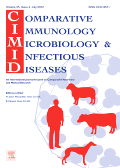
COMPARATIVE IMMUNOLOGY MICROBIOLOGY AND INFECTIOUS DISEASES
Scope & Guideline
Innovating Research in Infectious Disease Science
Introduction
Aims and Scopes
- Comparative Immunology:
The journal emphasizes studies that explore the immune responses of different species to pathogens, highlighting both innate and adaptive immunity. - Microbial Pathogenesis:
Research on the mechanisms of microbial pathogenesis, including virulence factors, transmission dynamics, and host interactions, is a core focus. - Zoonotic Diseases:
A significant portion of the journal's content is dedicated to zoonoses, exploring the transmission of infectious agents between animals and humans, and their public health implications. - Antimicrobial Resistance:
The journal addresses the growing concern of antimicrobial resistance in both veterinary and human medicine, reviewing resistance patterns and exploring novel therapeutic approaches. - Epidemiology and Surveillance:
Research articles often cover epidemiological studies and surveillance of infectious diseases in animal populations, contributing to better management and control strategies. - Molecular Diagnostics and Characterization:
Innovative diagnostic methodologies and molecular characterization of pathogens are frequently published, enhancing the understanding of disease mechanisms and improving diagnostic accuracy.
Trending and Emerging
- One Health Approach:
The integration of human, animal, and environmental health perspectives is increasingly prominent, reflecting a holistic view of disease prevention and control. - Genomic and Molecular Epidemiology:
Research utilizing genomic techniques to trace pathogen origins, mutations, and spread patterns is gaining traction, enhancing our understanding of infectious disease dynamics. - Probiotic and Microbiome Studies:
Emerging interest in the role of probiotics and the microbiome in disease prevention and health management, particularly in livestock and companion animals, is becoming a significant area of research. - Immunotherapy and Vaccine Development:
There is a rising number of studies focused on innovative vaccine strategies and immunotherapy to combat infectious diseases, driven by advancements in molecular biology and immunology. - Vector-Borne Diseases Research:
Increased focus on diseases transmitted by vectors, such as ticks and mosquitoes, is evident, particularly in understanding their epidemiology and control measures.
Declining or Waning
- Traditional Veterinary Pathology:
Research focusing solely on classical veterinary pathology without integrating molecular or immunological perspectives appears to be decreasing, possibly due to the growing emphasis on advanced diagnostic techniques. - Single-Species Studies:
There is a noticeable reduction in studies focusing exclusively on single species without comparative analysis, as the journal increasingly favors research that highlights cross-species insights. - Historical Epidemiological Data:
The trend of publishing retrospective studies based solely on historical data is waning, as more researchers prioritize real-time data collection and analysis for relevance in current health contexts.
Similar Journals

Emerging Microbes & Infections
Pioneering discoveries in microbial health.Emerging Microbes & Infections is a premier open access journal, published by Taylor & Francis Ltd since 2012, dedicated to advancing the understanding of microbial infections and their implications in human health. With an impressive Q1 ranking across multiple categories—including Drug Discovery, Epidemiology, Immunology, and Infectious Diseases—this journal is at the forefront of research in the microbiological sciences. Covering a diverse range of topics, it serves as a vital resource for researchers, healthcare professionals, and students alike. The journal's commitment to open access ensures worldwide dissemination of cutting-edge findings, fostering collaboration and innovation in tackling challenges posed by emerging infections. As part of the thriving academic community in the United Kingdom, Emerging Microbes & Infections plays a crucial role in shaping the future of infectious disease research and public health.
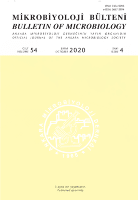
MIKROBIYOLOJI BULTENI
Unveiling the Complexities of Microbial LifeMIKROBIYOLOJI BULTENI, with ISSN 0374-9096, is a prestigious academic journal published by the ANKARA MICROBIOLOGY SOC, located in Ankara, Turkey. Established in 1973, this journal has been a vital conduit for disseminating research in the fields of Immunology, Microbiology, and Infectious Diseases, garnering a reputation as a significant contributor to the scientific community. The journal is currently ranked in the Q3 category within Immunology and Microbiology (miscellaneous), and Infectious Diseases, indicating its impactful presence amidst contemporary research. With access options that may be restricted, MIKROBIYOLOJI BULTENI actively welcomes submissions that advance the understanding of critical microbiological principles and practices, thereby supporting both national and international research efforts. Researchers, professionals, and students are encouraged to explore the latest findings shared in this journal, as it continually shapes the landscape of microbiology and infectious disease studies through its comprehensive and rigorous peer-reviewed publications.
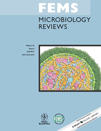
FEMS MICROBIOLOGY REVIEWS
Exploring the Frontiers of Microbial ScienceFEMS Microbiology Reviews, published by Oxford University Press, is a leading journal in the field of microbiology, with a notable impact in related disciplines such as infectious diseases and medicine. Since its inception in 1989, this esteemed journal has grown to occupy a prestigious position, consistently ranking in the first quartile (Q1) in various categories, including Infectious Diseases, Medicine (miscellaneous), and Microbiology. With an impressive Scopus ranking of #13 in Microbiology and #25 in Infectious Diseases, it is recognized for its high-quality and impactful reviews that bridge the gap between fundamental microbiological research and practical applications. Aimed at researchers, professionals, and students alike, FEMS Microbiology Reviews offers critical insights and comprehensive analyses, making it an essential resource for those engaged in the dynamic study of microbial life and its implications for health and disease.

DEVELOPMENTAL AND COMPARATIVE IMMUNOLOGY
Exploring the Frontiers of Immunological Development.DEVELOPMENTAL AND COMPARATIVE IMMUNOLOGY is a prominent academic journal published by Elsevier Scientific Ltd, dedicated to the exploration of immunological mechanisms across various developmental stages and species. With an ISSN of 0145-305X and an E-ISSN of 1879-0089, this journal caters to a multidisciplinary audience within the fields of Developmental Biology and Immunology. Classified in the Q3 category for both fields in 2023, it reflects a significant standing in its niche, evidenced by its Scopus rankings—with a notable 87th percentile in Agricultural and Biological Sciences and 81st percentile in Immunology and Microbiology. Spanning publications from 1977 to 2024, the journal presents peer-reviewed articles that address cutting-edge research and advancements in immunological responses throughout development. Although currently not an Open Access journal, DEVELOPMENTAL AND COMPARATIVE IMMUNOLOGY remains a vital resource for researchers, professionals, and students seeking to deepen their understanding of comparative immunology.
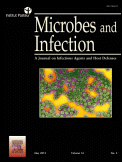
MICROBES AND INFECTION
Fostering Global Collaboration in MicrobiologyMICROBES AND INFECTION is a premier academic journal published by Elsevier, dedicated to the dynamic fields of immunology, infectious diseases, and microbiology. With a notable impact factor reflective of its high-quality research contributions, the journal is categorized in the Q2 quartile across these fields as of 2023. Based in France and operating since 1999, MICROBES AND INFECTION offers a platform for researchers, professionals, and students to disseminate and access cutting-edge findings that drive innovation and knowledge in microbial and infectious disease research. The journal is ranked impressively within the Scopus database, securing ranks such as #16 in Microbiology and #33 in Infectious Diseases, underscoring its high relevance in the scientific community. Subscribers to the journal can expect an array of articles, reviews, and original research, all designed to advance understanding and improve clinical practices in the fight against infectious agents. With its ongoing commitment to open access options, MICROBES AND INFECTION continues to foster global collaboration and information sharing in the pursuit of addressing pressing microbiological challenges.

Virulence
Empowering Researchers with Open Access DiscoveriesVirulence, a leading academic journal published by Taylor & Francis Inc, is dedicated to advancing the understanding of virulence mechanisms in pathogens across various infectious diseases. Since becoming an Open Access publication in 2018, it has broadened the accessibility of cutting-edge research for a global audience, promoting collaboration and knowledge-sharing among researchers, professionals, and students alike. With a significant impact within its field, the journal boasts impressive 2023 quartile rankings: Q2 in Immunology and Q1 in both Infectious Diseases and Microbiology, alongside notable standings in Parasitology. The current Scopus rankings reinforce its prominence, with high percentiles indicating its influence and relevance in advancing scientific inquiry. Covering a period from 2010 to 2024, Virulence serves as an essential platform for innovative research that not only addresses the critical challenges in understanding pathogen behavior but also contributes towards global health solutions, establishing it as a vital resource in the rapidly evolving fields of immunology, microbiology, and parasitology.
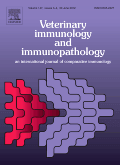
VETERINARY IMMUNOLOGY AND IMMUNOPATHOLOGY
Uncovering the secrets of disease resistance in animals.Veterinary Immunology and Immunopathology is a premier journal published by Elsevier, dedicated to advancing the field of veterinary science through rigorous investigations into the immunological mechanisms that underpin disease resistance, pathogenesis, and therapeutic interventions in animals. With an established history since 1979, this journal has consistently provided a platform for high-quality research, bridging the gap between immunology and veterinary medicine. The current impact factor reflects its significance within the field, particularly noted for its Q3 ranking in Immunology and Q2 in miscellaneous Veterinary categories as of 2023. The journal caters to a diverse audience, from seasoned researchers to students, by publishing original research, reviews, and case studies that explore pivotal topics such as vaccine development, immune response in various species, and the role of genetics in immunological disorders. Notably, it is indexed in Scopus, where it ranks in the top percentile of veterinary science disciplines, enhancing its visibility and impact within the scientific community. For those seeking to stay at the forefront of veterinary immunology, this journal is an invaluable resource.
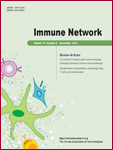
Immune Network
Fostering Collaboration in Immunology and AllergyImmune Network is a prestigious journal dedicated to disseminating high-quality research in the field of immunology, infectious diseases, and allergy, under the esteemed KOREA ASSOCIATION OF IMMUNOLOGISTS. Founded in 2016, this journal has quickly ascended to a top-tier publication, achieving Q1 rankings in 2023 in multiple relevant categories, including Immunology, Allergy, and Infectious Diseases. With a strong emphasis on innovation and interdisciplinary research, Immune Network appeals to a diverse audience of researchers, professionals, and students keen on advancing the understanding of immune responses and disease mechanisms. However, it is crucial to note that the journal operates under a subscription model without open-access provisions. Its impact factor further solidifies its reputation, reflecting the significant influence of the articles published. Located in South Korea, the journal serves as a global platform for sharing revolutionary insights and fostering collaborations within the immunology community.
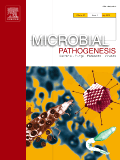
MICROBIAL PATHOGENESIS
Unraveling the Mysteries of Pathogen BehaviorMICROBIAL PATHOGENESIS, published by Academic Press Ltd - Elsevier Science Ltd, is a prominent journal in the fields of Infectious Diseases and Microbiology, with a notable impact factor and classified in the Q2 quartile for both categories as of 2023. Since its inception in 1986, this journal has provided a platform for the dissemination of cutting-edge research that enhances our understanding of microbial infections and their implications in health and disease. The journal is indexed in Scopus, ranking #80 among 344 in Infectious Diseases and #57 among 182 in Microbiology, underscoring its significant contribution to the scientific community. Although it operates under a traditional subscription model, the content is vital for researchers, professionals, and students focused on the dynamics of microbial pathogenesis and the development of innovative therapeutic strategies. The journal's comprehensive scope aims to foster advancements in this critical area of study, bridging the gap between laboratory research and clinical applications.
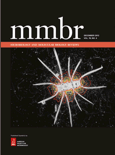
MICROBIOLOGY AND MOLECULAR BIOLOGY REVIEWS
Fostering Knowledge in the World of Microbiology and Molecular BiologyMICROBIOLOGY AND MOLECULAR BIOLOGY REVIEWS, published by the American Society for Microbiology, is a premier journal dedicated to advancing the fields of microbiology and molecular biology. With an impressive impact factor reflective of its Q1 ranking in categories such as Immunology, Infectious Diseases, and Molecular Biology, this journal consistently showcases high-quality, peer-reviewed articles that contribute to the current understanding of microbial life and molecular mechanisms. Operating since 1997, the journal aims to bridge the gap between microbiological methods and molecular biology applications, making it an essential resource for researchers, professionals, and students alike. Readers can access content through various platforms, ensuring that the latest findings are readily available to the scientific community. With its esteemed reputation, MICROBIOLOGY AND MOLECULAR BIOLOGY REVIEWS remains a leading voice in the exploration of the life sciences, catering to a broad audience deeply invested in unraveling the complexities of microbial and molecular systems.